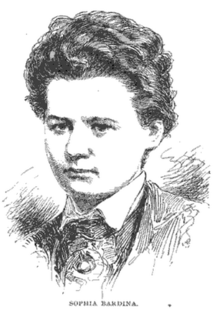Sophia Bardina
Sophia Bardina (15 May 1853 Tambov, Russia - 26 April 1883, Geneva, Switzerland) was a Russian revolutionary.

Biography
She was born to a violent father,[1] and turned to her studies for solace. Her family were landowners in Tver province, so she decided to study agronomy so that she could farm the land, rather than live off peasant labour.[2] Bardina went to Moscow and became friends with Olga Liubatovich. Together, hey went to study in Zurich.[3], where Bardina was a leading figure in the Fritsche circle of young feminist Russian students, among whom she was known as 'Auntie', "on account of her reliability and diplomatic talents." [4] It was she who introduced Vera Figner and her sister Lydia to radical political ideas.[5] Vera Figner was later the most famous terrorist at large in Russia.
In 1873, the Russian government ordered all women students in Zurich to return home. Bardina returned to Moscow, and in 1874, and obtained a job in a factory, hoping to recruit workers to the revolutionary movement. She was arrested in 1875, and spent two years in prison in Moscow. and was a defendant at the Trial of the 50, alongside Olga Liubatovich, Lydia Figner, Pyotr Alexeyev and others, and was sentenced to 10 years hard labour, later commuted to exile in Siberia. She escaped in 1880, and returned to Switzerland, where she fell seriously ill, and committed suicide.[6]
Quotes
"Yes, we are anarchists, but, for us, anarchy does not signify disorder, but harmony in all social relations; for us, anarchy is nothing but the negation of oppressions which stifle the development of free societies."[7]
References
- Cathy Porter, Fathers and Daughters: Russian Women in Revolution (Virago 1976).
- Engel, Barbara Alpern and Rosenthal, Clifford N. (1975). Five Sisters, Women Against the Tsar; The Memoirs of Five Revolutionaries of the 1870s. London: Weidenfeld & Nicolson. p. 7. ISBN 0 297 77065 9.
- "Sophia Bardina". Spartacus Educational. Retrieved 2017-09-30.
- Engel, Barbara Alpern and Rosenthal, Clifford N. (1975). Five Sisters, Women Against the Tsar; The Memoirs of Five Revolutionaries of the 1870s. London: Weidenfeld & Nicolson. p. 20. ISBN 0 297 77065 9.
- Engel, Barbara Alpern and Rosenthal, Clifford N. (1975). Five Sisters, Women Against the Tsar; The Memoirs of Five Revolutionaries of the 1870s. London: Weidenfeld & Nicolson. p. 7. ISBN 0 297 77065 9.
- Shmidt, O.Yu., Bukharin, N.I. et al (eds) (1926). Большая советская энциклопедиа. Moscow. pp. 707–08.CS1 maint: extra text: authors list (link)
- Alex Butterworth, The World that never was: A true story of dreamers, schemers, anarchists and secret agents (Vintage 2011): 171.
External links
An online biography of Sophia Bardina by John Simkin.
The book contains a biography of Bardina written in Odia in 1958